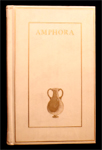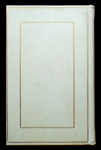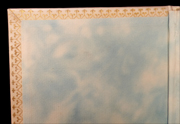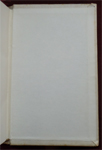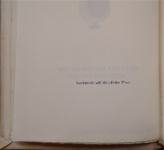100th
MP

|
THE
100th
MONKEY
PRESS |
|
|
|
Limited Editions by Aleister Crowley & Victor B. Neuburg |
|
Bibliographies |
|
Download Texts
»
Aleister
Crowley
WANTED !!NEW!!
|
|
AMPHORA |
|
Image Thumbnails |
||||||||||||||||||||||||||||||||||||||||||||||||||
|
Title: |
Amphora. |
|
||||||||||||||||||||||||||||||||||||||||||||||||
|
Variations: |
|
|||||||||||||||||||||||||||||||||||||||||||||||||
|
Publisher: |
Privately printed for the Authoress and Her Intimates.2 |
|||||||||||||||||||||||||||||||||||||||||||||||||
|
Printer: |
The Arden Press.2 |
|||||||||||||||||||||||||||||||||||||||||||||||||
|
Published At: |
Letchworth.2 |
|||||||||||||||||||||||||||||||||||||||||||||||||
|
Date: |
1908.4 |
|||||||||||||||||||||||||||||||||||||||||||||||||
|
Edition: |
First Edition, First Issue.5 |
|||||||||||||||||||||||||||||||||||||||||||||||||
|
Pages: |
viii + 82.1 |
|||||||||||||||||||||||||||||||||||||||||||||||||
|
Price: |
|
|||||||||||||||||||||||||||||||||||||||||||||||||
|
Remarks: |
Issued anonymously.
The Epilogue forms the obscene couplet ‘The Virgin Mary I desire but arseholes set my prick on fire’ formed by reading the first letter of the first word and the first letter of the last word. A simpler acrostic appears in the initial letters of the Prologue.
When Catholic circles responded favorably to the book, Crowley removed the epilogue and submitted it to the firm of Burns & Oates for republication.5 The book was republished again in 1912 under the title Hail Mary. |
|||||||||||||||||||||||||||||||||||||||||||||||||
|
Pagination:1 |
|
|||||||||||||||||||||||||||||||||||||||||||||||||
|
Contents: |
- Prologue - Amphora - Epilogue |
|||||||||||||||||||||||||||||||||||||||||||||||||
|
Author’s Working Versions: |
|
|||||||||||||||||||||||||||||||||||||||||||||||||
|
Other Known Editions: |
|
|||||||||||||||||||||||||||||||||||||||||||||||||
|
Bibliographic Sources: |
|
|||||||||||||||||||||||||||||||||||||||||||||||||
|
Comments by Aleister Crowley: |
|
|||||||||||||||||||||||||||||||||||||||||||||||||
|
Reviews: |
The anonymous author of Amphora (Burns and Oates, 2s. 6d. net.), is happily not under the common delusion that abundance of piety can atone for all other deficiencies in religious poetry. We have not met for a long time so lofty and sustained a poetic flight as in this series of verses in honour of our Lady. The thought is not overloaded with verbiage but expressed with simple dignity; as in the best architecture, what is ornamental is useful as well. We commend this little volume to all lovers of our Lady and of good poetry. —The Month, January 1909. ______________________________
Mr. Aleister Crowley's book was published two years ago anonymously. It consists of some three dozen poems to the glory of the blessed Virgin. They are all marked by that facility and freedom of diction and metrical fluency that are such striking features of the author's profaner books. Some of them are rather like hymns; some are exquisite verses with a Yellow-Booky flavour; and others are somewhat unsatisfactory exercises in forms which are not customarily used for such subjects. Here is a specimen of the last sort:—
Enshrined in cloistral sanctity I sit and worship solemnly: Mary is everything to me; I hail thee holy Mary.
By day and night I sit alone Mute as a monument of stone And meditate before the throne Of bright and blessed Mary.
The Jilt of this, and in places its phraseology, have in them something which scarcely bears witness to a humble and profound reverence for the mother of God on the steps of Heaven. Some of the poems are very much better than this, but all of them lack real fervour in respect of feeling just as in respect of form they lack that final touch which distinguishes the work of the born poet from that of the competent turner of verses. Personally, I find Mr. Crowley the devotee of Mary considerably less interesting and much less amusing than Mr. Crowley the singer of strange and obscene gods, Abracadabras, and things one doesn't mention. "Hail Mary," in fact , is dull. —The New Age, 21 December, 1911. ______________________________
This is a garland of some fifty or sixty devotional hymns to the Virgin, in which the author, while not exceeding the bounds of Catholic orthodoxy, fills his verses with quaint and charming conceits, very much in the style of the “metaphysical” poets of the seventeenth century. Indeed, in turning over the pages of “Amphora,” as the little volume was entitled when published anonymously two years ago, by Burns and Oates, we feel them to be the work of a recipient of the tradition of Vaughan the Silurist, George Herbert, and Crashaw, although Mr. Crowley is smooth where they are rugged, plain where they are perplexing. These poems indicate a mind full of earnest aspiration towards the spiritual Queen, a mind of an engaging naïveté, untroubled by the religious and philosophical problems which weary more complex intelligences. This little work can be cordially recommended to Catholic readers. —The Paris Daily Mail, date unknown. ______________________________
Mr. Aleister Crowley is a very interesting poet, not so much for any great originality in his technique, as for the passionate tenacity with which he holds to a mystical creed, put forth in an elaborate and eclectic symbolism. . . . He has not managed to hymn Mary in anything like the strain of poetry which the worship of Hecate once drew from him. Does this mean that, after all, Hecate means more to him than Mary? —The Daily News, date unknown. ______________________________
We crave for poetry in England, but we do not like poets, unless they are exceedingly conventional when we can laureate them, because in the national search for what is called character we condemn the vagaries which are the attributes of genius. Every school-girl reads Shelley, yet how badly we treated him! Byron is not allowed to rest in Poet’s Corner. We treated Swinburne as if he were Crippen. And we have treated Mr. Aleister Crowley in much the same way. Yet Mr. Crowley is one of our few real poets. He has written things in “Ambergris” which will never die. Some years ago a little book of verse appeared, called “Amphora,” which being anonymous was attributed to an actress. It bore a strong religious note, an ecstatic sense, and it was at once recognized as genuine poetry. Now it has come forth again, retitled “Hail Mary,” and signed Aleister Crowley. We hope it will be widely read, and serve as an introduction to some of Mr. Crowley’s other works of poetry. Particularly we hope the Church will look at it. They will find a religious sense that will astonish some of them. The real trouble about Mr. Crowley is this; he is a true poet—he cannot compromise. The persecution of silly and unkind men has wounded him. It is for literary men now to come forward and stand by him. Hear this:
We in the world of woe who stray Lift up our hearts to Thee and pray: Turn all our pain to virgin might, And all our sorrow into light!
May his enemies learn from these words to “lift up” their hearts with him. —The English Review, November 1911. ______________________________
Among the many books which benevolent publishers are preparing as appropriate Christmas presents we notice many new editions of favourite poetic classics. But few, we fancy, can be more appropriate for the purpose than a little volume of original verses, entitled “Amphora,” which Messrs. Burns & Oates are on the point of publishing. The following stanzas from a poem on the Nativity will surely be a better recommendation of the book than any words of critical appreciation:
The Virgin lies at Bethlehem. (Bring gold and frankincense and myrrh!) The root of David shoots a stem. (O Holy Spirit, shadow her!)
She lies alone amid the kine. (Bring gold and frankincense and myrrh!) The straw is fragrant as with wine. (O Holy Spirit, shadow her!) —The Tablet, Father Kent, date unknown. ______________________________
To the ordinary mind passion has no relation to penitence, and carnal desire is the very antithesis of spiritual fervour. But close observers of human nature are accustomed to discover an intimate connection between the forces of the body and the soul; and the student of psychology is continually being reminded of the kinship between saint and sinner. Now and then we find the extremes of self and selflessness in the same soul. Dante tells us how the lover kissed the trembling mouth, and with the same thrill describes his own passionate abandonment before the mystic Rose. In our own day, the greatest of French lyric poets, Verlaine, has given us volumes of the most passionate love songs, and side by side with them a book of religious poetry more sublimely credulous and ecstatic than anything that has come down to us from the Ages of Faith. We are all, as Sainte-Beuve said, "children of a sensual literature," and perhaps for that reason we should expect from our singers fervent religious hymns. We have published recently in Vanity Fair a good many poems of Mr. Aleister Crowley, we do not need to tell our readers that he is a master of verse, who sings of the delights of the body with a pagan simplicity and directness. Now he sends us a new book, ‘Amphora,’ a volume of religious verse: it contains song after song in praise of Mary:—
O Mary! Of Thy Motherhood To all thy worshippers, Bring us to thy beautitude Whose sweet inspiration stirs The soul lethargic unto good, The slaves to ministers!
Here is another poem which seems to have the true lyric passion in it:—
Be still, my soul, and let the sense Of her intuitive influence Steal like the whispers of young rains Upon thy bleak and barren plains By many a mental martyrdom Our sterile souls to Mary come. Who passeth through the surge and fire At last shall win to his desire
**********************
Be still my soul, whate’er avail! Through Mary they shall not prevail; And thou resigned in peace await Her peace at Her appropriate date. Amen.
We know no better way of praising these hymns than by simply transcribing them:-
Queen of Mercy, Queen of Might, Bring us to Thine ardent light! We are weak and violent: By Thy mystic sacrament Bring us to Thy power and peace, To the passionless release!
Queen of Splendour; Queen of Love, Bring us to Thine House above, Wherein love and splendour dwell All the saints that praise Thee well. Bring us to their great content By Thy mystic sacrament! Amen!
—Vanity Fair, 9 December 1908. ______________________________
Outside the Latin Church conflicting views are held
about the worship of the Virgin, but there can be no doubt that
this motive of religion has given birth to many beautiful pieces
of literature, and the poets have never tired of singing
variations on the theme of “Hail Mary.” This little book is best
described here as a collection of such variations. They are
written with an engaging simplicity and fervour of feeling, and
with a graceful, refined literary art that cannot but interest
and attract many readers beyond the circles of such as must feel
it religiously impossible not to —The Scotsman, date unknown. ______________________________
In this slight volume we have the utterances of a devout anonymous Roman Catholic singer, in a number of songs or hymns addressed to the Virgin Mary. The author, who has evidently a decided gift for sacred verse and has mastered varied metres suitable to her high themes, divides her poems into four series of thirteen each. thus providing a song for each week of the year. The songs are all of praise or prayer addressed to the Virgin, and though many have a touch of mysticism, most have a simplicity of expression and earnestness of devotion that will commend them to the author’s co-religionists. —The Daily Telegraph, date unknown. ______________________________
This anonymous volume of religious verse reaches a very high level of poetic imagery. It is a series of hymns in honour of Our Lady, invariably expressed in melodious verse. The pitfalls of religious verse are bathos and platitude, but these the sincerity of the writer and a certain mastery over poetic expression have enabled him or her to avoid. The writer of such verse as the following may be complimented on a very high standard of poetic expression:
The shadows fall about the way; Strange faces glimmer in the gloom; The soul clings feebly to the clay, For that, the void; for this, the tomb!
But Mary sheds a blessed light; Her perfect face dispels the fears. She charms Her melancholy knight Up to the glad and gracious spheres.
O Mary, like a pure perfume Do thou receive this falling breath, And with Thy starry lamp illume The darkling corridors of death! —The Catholic Herald, date unknown. ______________________________
An interesting group of Catholic songs or hymns appears in a volume entitled “Amphora” (Burns and Oates). From among them one of the hymns may be quoted on “The Feast of the Nativity”:
The Virgin lies at Bethlehem. (Bring gold and frankincense and myrrh!) The root of David shoots a stem, (O Holy Spirit shadow Her!)
She lies alone amid the kine. (Bring gold and frankincense and myrrh!) The straw is fragrant as with wine. (O Holy Spirit shadow Her!)
There are three kings upon the road. (Bring gold and frankincense and myrrh!) She hath thrice blest the Trinity. (O Holy Spirit shadow Her!)
There stands her star above the sky. (Bring gold and frankincense and myrrh!) She hath thrice blest the Trinity (O Holy Spirit shadow Her!)
Her joyful ardour hath sufficed. (Bring gold and frankincense and myrrh!) She is delivered of the Christ. (The angels come to worship Her!) —The Shoreditch Observer, 30 January 1909. ______________________________
As far as we can gather from his other works, the author is not a Catholic, perhaps not even, strictly speaking, a Christian; but here we have page after page of most exquisite praise of Her, whom Wordsworth greeted as our tainted nature’s solitary boast,. until one marvels at the fecundity of concept, imagery, and fit expression. —The Catholic Times, date unknown. ______________________________
The “Amphora” is a collection of poems in honour of our Blessed Lady. They are arranged in four books, each of which contains thirteen pieces. Thus with the prologue there are fifty-three poems in all. Needless to say they breathe a spirit of deep piety and filial love towards our Heavenly Mother. Many beautiful and touching thoughts are embodied in the various verses, which cannot but do good to the pious soul. —The Catholic Times, date unknown. ______________________________
Under this title there has appeared an anonymous volume of verses breathing the same exotic fragrance of Rossetti’s poem on Our Lady that begins “Mother of the fair delight.” There is the same intense pre-Raphaelite atmosphere, the same aesthetic revelling in Catholic mysticism, the same rich imagery and gorgeous word-colouring that pervade the poetic works of that nineteenth-century artist. A valuable addition to the poetic literature on the Mother of our Lord. —The Staffordshire Chronicle, date unknown. ______________________________
The devotional fervour of “Amphora” will make them acceptable to those who address their worship to the Blessed Mother of the Christ. The meaning of the title of the book is not very obvious. It cannot surely have anything to do with the lines in Horace, “Amphora coepit,” etc. —The Guardian, date unknown. ______________________________
Not without a certain lyrical sweetness. Devotion to the Mother of God is the subject of all the poems, and it seems odd coming from one who is understood to be a worshipper at strange, exotic, and forbidden shrines. But the artistic temperament is doubtlessly accountable. . . . —The Catholic Herald, date unknown. ______________________________
The hymns ordinarily used in churches for devotional purposes are no doubt excellent in their way, but it can scarcely be said, in the case of many of them, that they are of much literary merit, and some of them indeed are little above the familiar nursery rhymes of our childhood; it is therefore somewhat of a relief and a pleasure to read the volume of hymns to the Virgin Mary which has just been published by Messrs. Burns & Oates. These hymns to the Virgin Mary are in the best style, they are devotional in the highest degree, and to Roman Catholics, for whom devotion to the Virgin Mary forms so important a part of their religious belief, these poems should indeed be welcome; personally I have found them just what I desired, and I have no doubt other Catholics will be equally pleased with them. —Lieut. Col. Gormley. |
|||||||||||||||||||||||||||||||||||||||||||||||||
